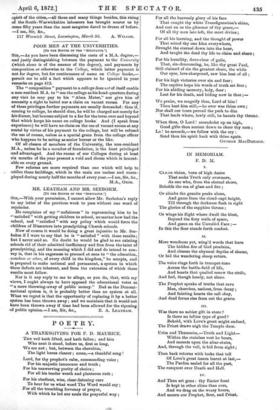POOR MEN AT THE UNIVERSITIES.
[TO THE EDITOR OF THE "SPECTATOR."]
&n,—As you have been discussing the costs of a M.A. degree,— and justly distinguishing between the payment to the University (which alone is of the essence of the degree), and payments by -composition or otherwise to the College, which latter payment is not for degree, but for continuance of name on College books,— permit me to add a fact which appears to be ignored in your -remarks on page 412.
The "composition" payment to a college does not of itself enable -a non-resident M.A. to "use the college as his head-quarters during -any visit he may pay to his "Alma Mater," nor give him of necessity a right to battel nor a claim on vacant rooms. For any -of these privileges further payments are usually demanded : thus if, -coming to college, he should dine, he will be charged not merely for his dinner, bat become subject to a fee for the term over and beyond -that which keeps his name on college books. And (I speak from -experience) he will have no claim on the use of vacant rooms at any rental by virtue of his payment to the college, but will be refused the use of rooms, unless as a special grace from the college officer who happens to be acting as senior bursar or the like.
Of all classes of members of the University, the non-resident M.A., unless he be a member of foundation, is the least privileged and advantaged. And the rooms of our Colleges during at least six months of the year present a void and disuse which is lament- able on every ground.
Few reforms are more required than one which will help to ,utilize these buildings, which in the main are useless and unem- ,ployed during nearly half the months of every year.—I am, Sir, &c., M.A., Oxon.


































 Previous page
Previous page